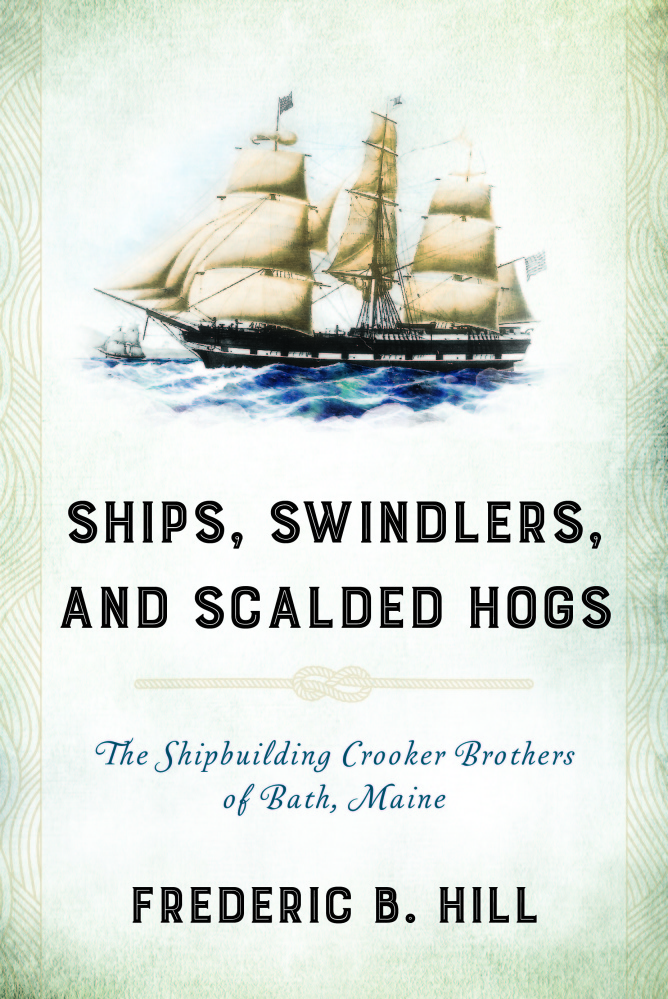Frederic B. Hill has an interesting resume. A former foreign correspondent for the Baltimore Sun, Hill did a stint as foreign affairs advisor to the famously liberal Republican Sen. Charles Mathias before joining the State Department. He has now turned his attention to a fascinating morsel of history.
“Ships, Swindlers, and Scalded Hogs” is an account of a significant local family, in an important industry, during a crucial period in the history of the United States. At the 19th century’s midpoint, Hill’s forbears owned the most successful ship-building business in Bath, the firm of C & WD Crooker. William Donnell Crooker (W.D.) was the author’s great-great grandfather. The C stood for Charles, William’s older brother by eight years.
Starting with a general store on the wharfs, Charles and William built a shipyard that, in its heyday, turned out one or two new ships almost every year. Hill points out that it was a sign of the bustle of the times that this was by no means unusual; rather, the need to procure the goods on the shelves, both locally and from abroad, made the evolution from store-keeper to ship-builder quite logical. Given the natural resources along the Kennebec, specifically all the species of trees needed for different parts of a ship, it was almost inevitable.
At the time, Bath was one of the largest shipbuilding centers in the country. In 1854, only Boston and New York produced a greater tonnage. This is all the more impressive considering that a mere 60 years before, Bath had been little more than a trading village on the eastern frontier. Thus, the story of C & WD Crooker is also the story of the city’s rise and, by extension, of the young country’s rapid economic development.
The story of the family is more like a Greek tragedy. At the height of their success as shipbuilders, the Crooker brothers were badly swindled twice (which introduces some colorful characters to the saga, in contrast to the staid Bath grandees). William blamed Charles, and the brothers turned against each other.
In addition to their personal woes, the times were changing. Charles prudently extracted himself from the shipbuilding business. William plowed on until he was bankrupt. He never fully recovered. The company was effectively dissolved, and the brothers sued each other over the assets. So complicated were the financial details that it took a “receiver, several referees, and a second administrator” 14 years to sort it all out. Before the case was settled, William was dead of tuberculosis.
His great-great grandson has done an extraordinary amount of research into family papers. Both men come across as interesting citizens who reflect the preoccupations of their times. Besides his business, William was an inveterate tinkerer, always sending his inventions to the patent office (unsuccessfully). Charles had an avocation for botany and particularly for making botanical remedies, such as cholera syrup. They both ended up cantankerous old men.
The Crookers and their associates crossed paths with a number of more famous historical figures. One of the swindlers was closely involved with Boss Tweed and the political machine of Tammany Hall in New York. Charles’ son-in-law, Arthur Sewall, was William Jennings Bryan’s running-mate many years later. Another son-in-law was captain of a ship sunk by the Confederate commerce raider Alabama, made famous by its final duel with the Kearsarge off Cherbourg. A cousin was captain of the luxury cruise Mark Twain turned into his first literary success, “The Innocents Abroad”; he sued Twain for slander and won an award of 12 cents.
Hill is a stickler for details, and every now and then, their profusion threatens to overwhelm the story, making it hard going for the reader. In a couple of places, the names, dates of launch, tonnage or captain of ship after ship take over the narrative like the “begats” in the Old Testament.
“Anyone who dares to assess generations-old events, personalities, and motivations and advance a definitive conclusion is more in pursuit of ghosts than truths,” the author writes, perhaps a little defensively. Any effort to turn his research into a family story, he says, would have been a “daunting guessing game.”
Certainly, Hill has been scrupulous in refraining from such a pursuit. Beyond allowing that “their ambition, egos, greed, and mutual distrust” got the better of the brothers, he prefers to tabulate the evidence and let it speak for itself. I am not convinced history needs to be quite so black and white. A freer interpretive hand might have made his protagonists come alive a little more.
That’s a small complaint compared to the many-faceted story of Maine’s early history to be found in his book.
Thomas Urquhart is a former director of Maine Audubon.
Send questions/comments to the editors.




Success. Please wait for the page to reload. If the page does not reload within 5 seconds, please refresh the page.
Enter your email and password to access comments.
Hi, to comment on stories you must . This profile is in addition to your subscription and website login.
Already have a commenting profile? .
Invalid username/password.
Please check your email to confirm and complete your registration.
Only subscribers are eligible to post comments. Please subscribe or login first for digital access. Here’s why.
Use the form below to reset your password. When you've submitted your account email, we will send an email with a reset code.